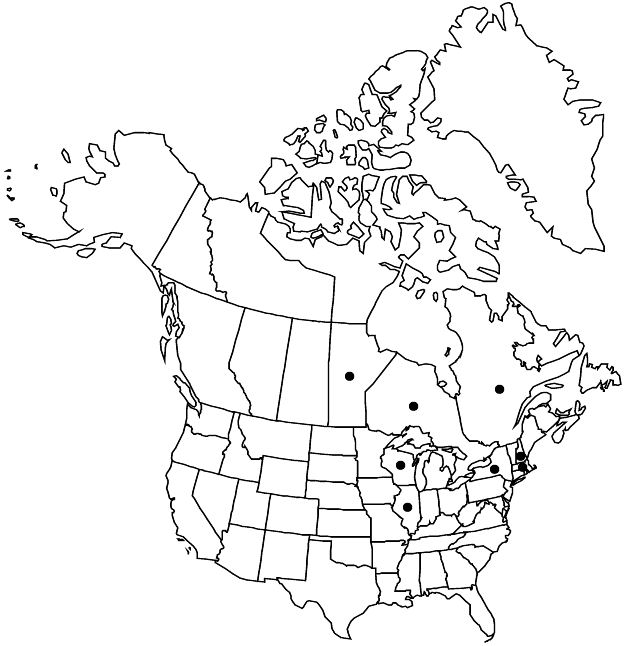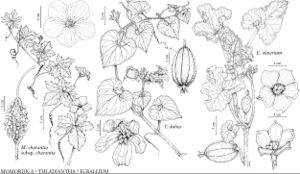Difference between revisions of "Thladiantha dubia"
Enum. Pl. China Bor., 29. 1833.
FNA>Volume Importer |
imported>Volume Importer |
||
| (5 intermediate revisions by 2 users not shown) | |||
| Line 10: | Line 10: | ||
|special_status={{Treatment/ID/Special_status | |special_status={{Treatment/ID/Special_status | ||
|code=F | |code=F | ||
| − | |label= | + | |label=Illustrated |
}}{{Treatment/ID/Special_status | }}{{Treatment/ID/Special_status | ||
|code=I | |code=I | ||
| Line 31: | Line 31: | ||
|elevation=10–200 m | |elevation=10–200 m | ||
|distribution=Man.;Ont.;Que.;Ill.;Mass.;N.H.;N.Y.;Wis.;Asia (China;Russia);introduced also in South America (Ecuador);Europe;elsewhere in e Asia (China;Japan);Pacific Islands (Galapagos Islands). | |distribution=Man.;Ont.;Que.;Ill.;Mass.;N.H.;N.Y.;Wis.;Asia (China;Russia);introduced also in South America (Ecuador);Europe;elsewhere in e Asia (China;Japan);Pacific Islands (Galapagos Islands). | ||
| + | |introduced=true | ||
|discussion=<p><i>Thladiantha dubia</i> is characterized by its ovate-cordate, unlobed leaves; relatively large, solitary flowers with narrow, recurving sepals, campanulate corollas, yellow petals, usually with recurving apices; and pendulous, hirsute-villous, orange-red fruits. It is grown as an ornamental, especially for its large, bell-shaped flowers and brightly colored fruits. Few populations are apparently outside of cultivation at present, but even staminate plants are potentially invasive because of the spread by tubers.</p> | |discussion=<p><i>Thladiantha dubia</i> is characterized by its ovate-cordate, unlobed leaves; relatively large, solitary flowers with narrow, recurving sepals, campanulate corollas, yellow petals, usually with recurving apices; and pendulous, hirsute-villous, orange-red fruits. It is grown as an ornamental, especially for its large, bell-shaped flowers and brightly colored fruits. Few populations are apparently outside of cultivation at present, but even staminate plants are potentially invasive because of the spread by tubers.</p> | ||
|tables= | |tables= | ||
| Line 40: | Line 41: | ||
-->{{#Taxon: | -->{{#Taxon: | ||
name=Thladiantha dubia | name=Thladiantha dubia | ||
| − | |||
|authority=Bunge | |authority=Bunge | ||
|rank=species | |rank=species | ||
| Line 55: | Line 55: | ||
|publication title=Enum. Pl. China Bor., | |publication title=Enum. Pl. China Bor., | ||
|publication year=1833 | |publication year=1833 | ||
| − | |special status= | + | |special status=Illustrated;Introduced |
| − | |source xml=https:// | + | |source xml=https://bitbucket.org/aafc-mbb/fna-data-curation/src/2e0870ddd59836b60bcf96646a41e87ea5a5943a/coarse_grained_fna_xml/V6/V6_7.xml |
|genus=Thladiantha | |genus=Thladiantha | ||
|species=Thladiantha dubia | |species=Thladiantha dubia | ||
Latest revision as of 23:23, 5 November 2020
Leaf blades 5–10 × 4–9 cm, base cordate, apex short-acuminate, surfaces hirsutulous. Inflorescences: peduncle 5–15 mm. Flowers: hypanthium 2–4 mm; sepals recurving, 12–13 mm; petals ca. 25 mm, apex acute. Pepos 4–5 cm, surface with 10 obscure furrows. 2n = 18.
Phenology: Flowering Jun–Sep.
Habitat: Roadsides, thickets, pastures, waste places
Elevation: 10–200 m
Distribution

Introduced; Man., Ont., Que., Ill., Mass., N.H., N.Y., Wis., Asia (China, Russia), introduced also in South America (Ecuador), Europe, elsewhere in e Asia (China, Japan), Pacific Islands (Galapagos Islands).
Discussion
Thladiantha dubia is characterized by its ovate-cordate, unlobed leaves; relatively large, solitary flowers with narrow, recurving sepals, campanulate corollas, yellow petals, usually with recurving apices; and pendulous, hirsute-villous, orange-red fruits. It is grown as an ornamental, especially for its large, bell-shaped flowers and brightly colored fruits. Few populations are apparently outside of cultivation at present, but even staminate plants are potentially invasive because of the spread by tubers.
Selected References
None.
